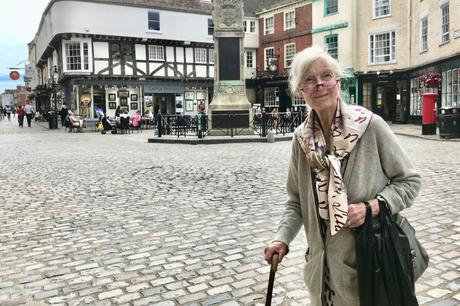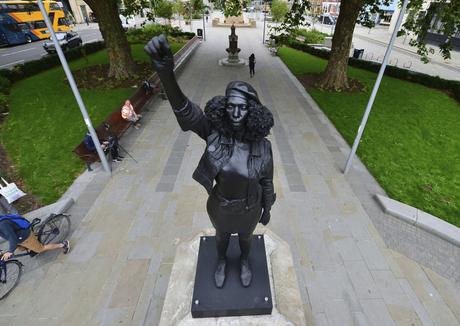
(Canterbury) She stops at our table, as if out of nowhere. In a small mouse voice, she asks if we can give her the piece of toast lying on our plate.
Published on 19 July 2020 at 6 a.m. 00

La Presse
“It's to feed my seagulls. A beautiful little couple. I love them. “
With pleasure madam. She puts the bread in her plastic bag, then we start talking … for better and for worse.
This is our first visit to the UK in four months. The country has just lifted the quarantine measures and is starting to reopen. Forty-five thousand deaths later, we are still far from a return to normalcy. British customs have become paranoid, you have to fill out miles of paperwork to enter the country.
When you arrive in Canterbury, a postcard town famous for its cathedral, many shops on the main street are still closed or in the process of being “refurbished”. Ditto for restaurants. The tourist shops are completely empty.
“How do you want to restart when there are no more clients? “, Explains the owner of the Panteli’s café, looking sheepish. ” Look. I can accommodate up to 100 people. The room is empty. Fortunately I have a few tables outside … “
This is where we are, finishing our lunch, when Patricia appears. A charming old lady, dressed to the nines. Very chic with her big red flower in her hair, her bourgeois scarf. Smart eyes, little mauve glasses at the end of his nose, cane in hand. A beautiful grandmother, like in the movies
Seduced by his kindness, we invite him to sit down.
We're talking about the pandemic, of course. She is years old. We ask her how she lived it, at her age.
She was not afraid. She saw others.
“COVID is no worse than war. When I was little I would see Spitfires chasing Luftwaffe planes across Canterbury skies. So you can imagine COVID… ”
The health crisis still left him with a “bitter taste”. Not that she was bored. “You never get bored when you have a garden. But she finds that “too much” has been done with this story. “Was it really necessary? “
We are talking about her three boys, whom she has not seen for months. She lives alone, having been married twice. Sensible point. Her second husband died not so long ago. She sighs.
We also talk about Canterbury, where she has lived all her life. She is not unhappy that there are fewer tourists. She especially does not regret the groups of French schoolchildren – “rude young people”.
And then the tone hardens. The beautiful picture cracks. Aside from England, “the best place in the world”, no country finds favor with it. Not even Scotland or Northern Ireland, which are part of the UK.
Canada, perhaps? “Pff … never. “
We are hardly surprised when she tells us about her admiration for the Queen and Prince Charles. But she despises Harry and Meghan, who will bring “mixed blood” to the royal family. These two are of no value to him anymore. “Let them stay where they are. “
What about Brexit? “I voted for, of course. ” Is that so ? Why ? “So that we can get rid of all those pissers. “
Does it refer to immigrants? We don't have time to ask her the question that a car with two black men is driving past us. ” You did see ? Two negros … These people are just making trouble. “
An angel passes. It has concrete wings. So that's the other face of English sovereignty. Brexit enthusiasts are often represented by the cliché image of the toothless hooligan, covered in tattoos, who gets drunk on bad beer. They can also look like a charming old lady who gives bread to seagulls. Discreet, kind, elegant. But of great violence.
“Aren't you going a little too far, Patricia?
– Usually, I don't talk about that. But with you I can. You come from far away!
– I'm still a journalist…
– Whatever ! I offer you coffee? “
Racism and statues
If you thought racism was less prevalent in Britain than in the United States, think again.
According to a YouGov survey published in June in the wake of the Black Lives Matter movement, 83% of Britons believe that racism still exists in the UK … the same proportion as there is 30 years (86%).
In another YouGov poll, we learn that half of black Britons say they have been victims of racism on the streets or in their workplace.
That is to say if the situation is evolving slowly, although some nuances apply.
Some, in any case, do not wait for society to change. The statue of slaver Edward Colston, who had been unbolted and thrown into the water in Bristol Harbor, was replaced this week by another statue, this time representing Jen Reid, an activist Black Lives Matter. The gesture, made during the night, caused a lot of talk in the British media.

PHOTO BEN BIRCHALL, ASSOCIATED PRESS
The statue representing activist Jen Reid, in Bristol
89184577The City had the statue removed two days later, inviting its authors to donate it to the local museum…
In France
Same theme, return to France.
The deputy Alexis Corbière, right-hand man of Jean-Luc Mélenchon within the rebellious France party, asks that Jean-Baptiste Belley be upgraded.
Jean-Baptiste Belley is the first black deputy in the history of France. Originally from Santo Domingo, present-day Haiti, he was elected in 1793, when slavery is in the process of being abolished (before being reinstated again, but that's another story).
Death in 1805, the man was the subject of some writings, but remains very little known to the general public. The only portrait we know of him hangs in Versailles, and “not at all highlighted,” explains Alexis Corbière.
Mr. Corbière would like the painting to be brought back to Paris, to the National Assembly. He also calls for a salon of the venerable institution to be renamed after Jean-Baptiste Belley. In the wake of Black Lives Matter, these gestures would have symbolic value.
Other activists asked that the statue of Jean-Baptiste Colbert (1619 – 1619), author of the Black Code which legalized slavery in France, be withdrawn of the National Assembly.
But Mr. Corbière swears that his approach is different. “We are not trying to delete, but we think there are characters to add. We find that the way in which history is transmitted leaves little room for popular history, for the oppressed, for women, for blacks. It's not just the story of the victors, and Belley is a figure who fought for emancipation … “
His request went unheeded. “A bit of a shame,” said the MP. According to him, this would have the merit of fueling the debate on racism and identity in France. “Not for self-flagelling,” he concluded, “but to learn and not repeat the mistakes of the past. “

